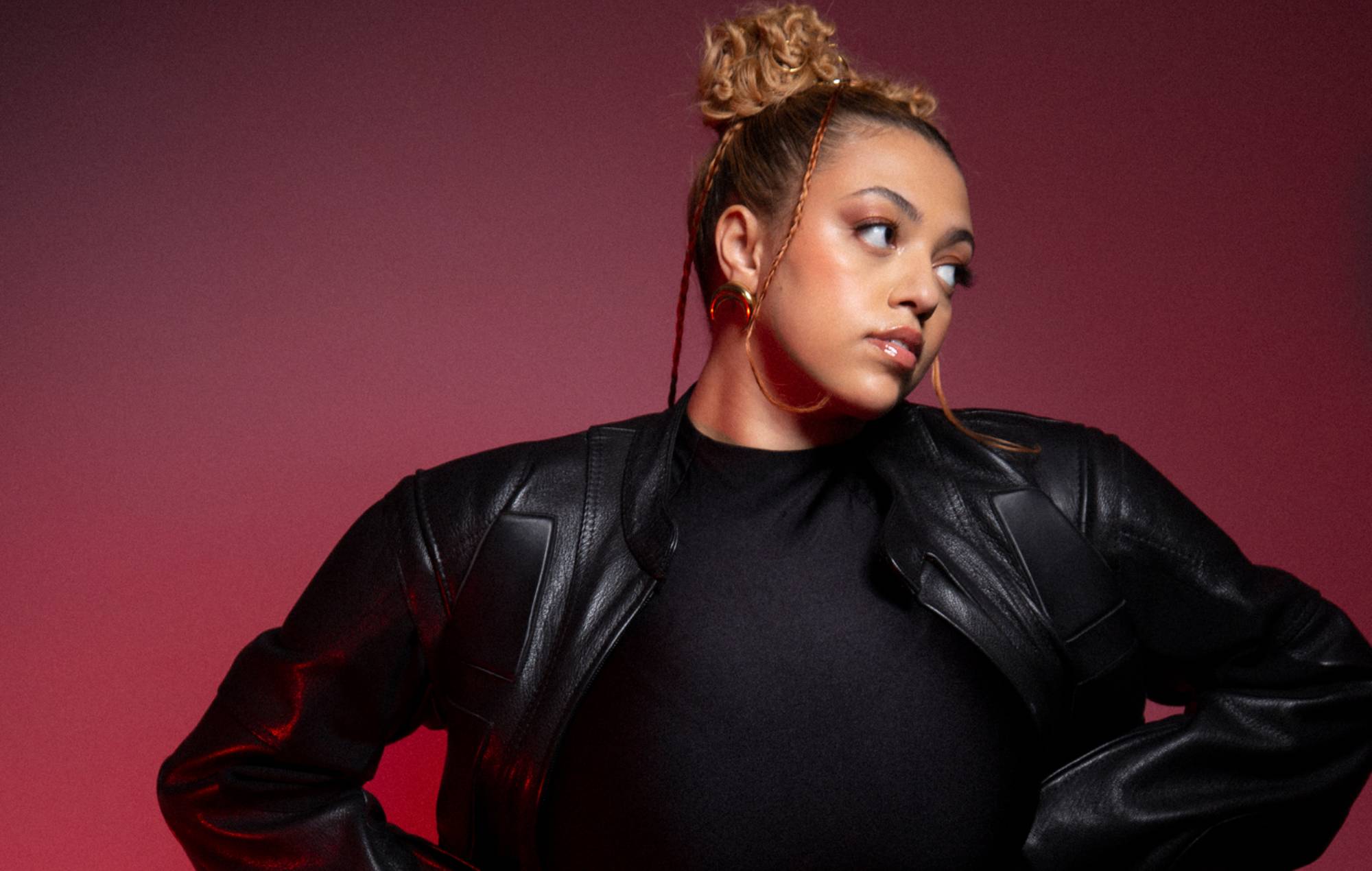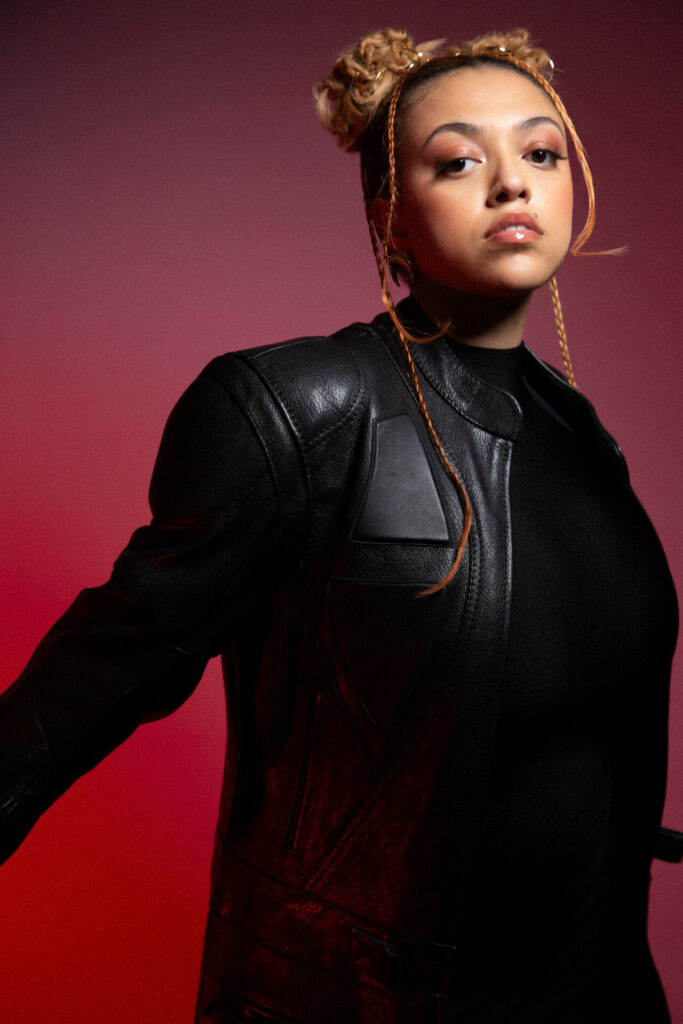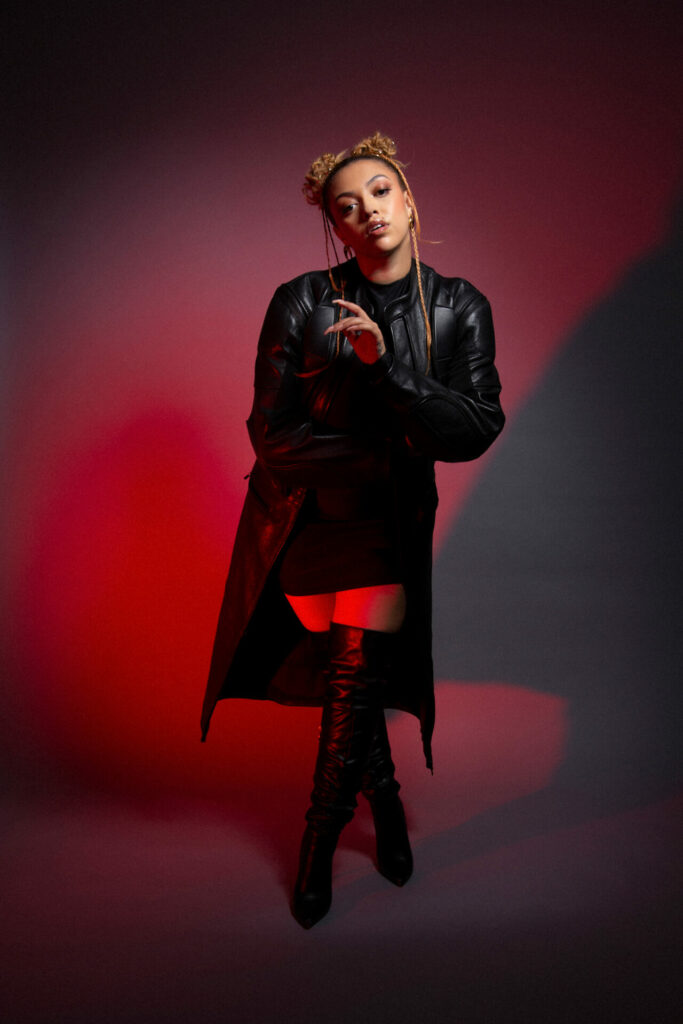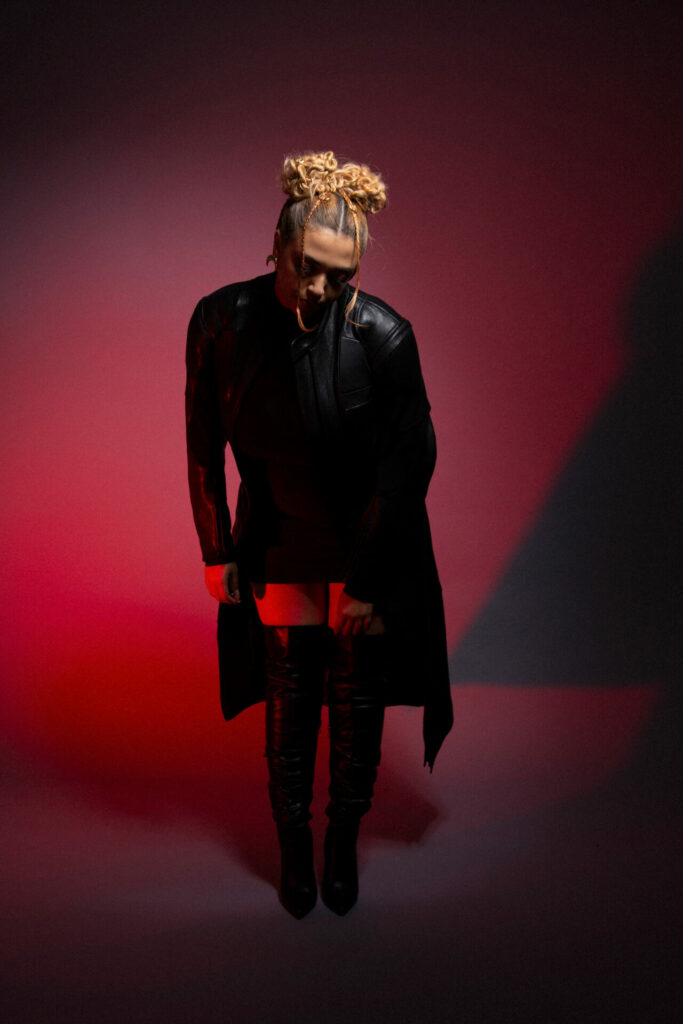Mahalia is opening her heart and living IRL
In new album IRL, Mahalia explores the pain of the past but keeps her faith in her philosophy: to live life with an open heart
By Tara Joshi

It’s lunchtime in east London, and we’re in an intimate, dimly lit restaurant not far from where 25-year-old Mahalia Burkmar lives. Waiting on our order of chewy homemade dumplings, crisp cold noodles and cucumber salad, the Leicestershire born artist from the small town of Syston is chatting about her love of a certain hit TV show. “We’re talking season one: Daphne and the Duke,” she gushes with a wide smile.
Ahead of writing her second album, Shonda Rhimes’ raunchy period romp Bridgerton had a surprisingly big impact on the singersongwriter. “Shonda will never understand that that saved me,” she says. Occasionally, Mahalia pops a little pouch of elder ower snus into her mouth and winces slightly (after seven years, she decided to quit smoking), or else peppers silences by singing along to the tunes on the restaurant’s playlist (she seems especially pleased when Christine and the Queens’ ‘Tilted’ comes on). Everything about the young star — dressed in a black Stüssy hoodie with a black racer vest underneath, and her mid-length blonde hair pulled back in a ponytail — is amiable as all this might suggest: her demeanour is easy, effusive, and, overall, she seems pretty happy.
Cut back to a few years ago, though, and that wasn’t the case. As with so many musicians, her career suddenly felt deeply precarious in the midst of the Covid-19 lockdowns. At the end of 2019, Mahalia put out her debut album, Love and Compromise, but what should have been a year of touring
and festivals was put on hold. Around the same time, she had her heart broken — and so it was that Mahalia found herself home alone (her ex took the dog, too). She felt completely unable to write
music and was too sad to sleep in a bed that now seemed big and lonely, and so instead
she would lie on the sofa watching Netflix. “I was just in this pit of sadness, eating Super Noodles every day — some days my friends were basically force-feeding me Super Noodles — it was a really deep part of my life. And then I honestly think it was something about Bridgerton,” she laughs,
unabashed.
“I’d moved into my flat, I’d started seeing a therapist, and then I found the show and it pulled me out of whatever I was in. I was giggling, I was crying, I was really looking at love again — and even
though it was in a show, I was looking at it again like it was something magical. And
then I started writing.”

It was around the same time — during the Eat Out to Help Out period — that Mahalia went to a bar with some mates, just having a pint on the street, and ended up locking eyes with someone new. “It was all just alignment; everything made sense,” she beams, recalling the first meeting with the man who would become her current boyfriend. “Suddenly I had someone to go through the motions with, to talk about love with.”
The two of them started to write together, making the beginnings of what would become
IRL, Mahalia’s impressive second album. It’s a vibrant record which spans bangers and silky
slow jams, all topped with her sumptuous voice and forthright lyrics. There are tracks where she’s just flexing, or checking in on her anxieties, conveying that her lifestyle is not as glamorous as people might assume, but there’s one overarching theme. It’s apparent on hefty lead single ‘Terms and Conditions’, which makes her expectations of lovers clear: “If you want my love / Then let’s discuss the man you’re required to be”. On ‘Lose Lose’, she notes the pleasure of loving, but says that
beyond the whirlwind, if it’s not working, she is willing to let go of that person (and, tacitly, a part of herself ). Elsewhere, JoJo appears for a glorious R&B stomper with the duo calling out cheaters like they’re giving advice to a mate, while Stormzy makes a tender contribution on ‘November’, a
beautiful track which Mahalia correctly describes as a wedding slow-dance song. On it, she delicately offers lines like “Dreaming’s not as good as life, with you in it” while later acknowledging, “I love you even if you hurt me — and you might”.
IRL, then, finds a young woman growing up — on the title track she is literally in conversation
with her younger self. Mahalia is embracing all parts of her being and acknowledging past
hurt and loss, while still opening up to love all over again — because even with the potential
for grief, she wagers that it’s worth it. And this time around, she is unafraid to ask her partners
for more and to leave them behind if they can’t provide it.

I tell her that I wish this album had existed a decade ago, so that I might have treated myself a bit better in romantic love during my twenties. Although she’s delighted with the idea of it serving that purpose for young women, she’s also adamant that this record is for everyone. “I think people
think I hate men,” she scoffs.
“But what I’m really trying to do is change something; change the way of thinking. I have been with boys since childhood who could never express their emotions and told me I was crazy.”
Indeed, her storytelling here is far more nuanced than lazy misandry. We talk at length about patriarchy, and how even seemingly innocuous things like young boys pulling girls’ hair at school as a means to get attention ends up in situations where, in heterosexual relationships, men express
affection by hurting women, and women think they’re in the wrong if they question
that. “This shit’s been going on since I was a fucking baby, and it’s not changing quickly —
it’s systemic,” she exclaims. The conversation digs deeper as we discuss imposter syndrome more broadly, diving into how structures have been built with white, cis, hetero men in mind so those of us who fall outside those identities feel uncomfortable — and how that can show up not only in our
professional lives, but also our romantic ones. “This game is rigged,” she nods, vigorously.
“This game wasn’t built for me to succeed and find love and ask for what I need from a lover; it was built for us as women to sit down, agree, conform. And I suppose the place I’m at now is: I’m just
not doing it.”
Mahalia’s 2019 album drew from that infamous Eartha Kitt interview where the jazz singer was asked if she would be willing to compromise in a relationship with a man. In the clip she throws her head back, cackling in that infamously unassailable tone: “Stupid! A man comes into my life, and I
have to compromise? For what? A relationship is a relationship that has to be earned […] When
you fall in love… What is there to compromise about? […] I fall in love with myself, and I want
someone to share it with me.”
It’s often the case that an artist will spend a lifetime revisiting the same themes in their work, turning over and reexamining ideas as they gain new experience and grow. Kitt’s positing of self-actualisation and boundaries sitting hand in hand with an openness to vulnerability and softness remain central to Mahalia’s second album. Only this time the concept feels sturdier, like it’s something she feels and knows more clearly than ever. “I think there’s a lot of strength to this album,” she agrees. “I thought that about my first album until I wrote this one — but this is
more like feeling strong from the inside and allowing that to show on the outside. For me,
this is definitely my most vulnerable [music].”

Assured honesty is a throughline in Mahalia’s work. At the age of 25, it’s strange but not untruthful to say she is already something of a veteran in the UK music scene, having signed to a major label when she was 13 years old. “I was always a bit nuts as a kid,” she says, recalling a youth spent dancing, painting, acting and writing poems after her mum regularly read her Maya Angelou before
going to bed.
Mahalia’s parents were in a band called Club O, gigging all over Leicester playing what her dad calls ‘psycho-acoustic soul’. “He was always writing songs in the house, always playing guitar, always singing,” she says, “And mum was always singing and writing with him. And I must have watched them doing that from the age of four — and they’re still doing it now.” She remembers sitting front row at their shows with her brothers. “So, I think it [music] almost felt kind of inevitable. Maybe at first I was kind of copying my dad,” she grins. “I do remember thinking it was amazing he could create something with his hands like that.”
On a rotating diet of Adele, Kate Nash and Ed Sheeran (she recalls hearing ‘The A-Team’ for the first
time on a mate’s BlackBerry in the school changing rooms after PE), Mahalia started learning guitar,
drums and bass around the age of 11. She began writing songs around the same time (“It didn’t feel weird to me, because I watched my parents do it all the time”). Her reason for writing was, like so much great art, born out of a desire to impress someone she fancied. “I think I honestly started writing songs because I wanted to tell a boy that I really liked him,” she laughs. “One of the songs I wrote for him I sang in the talent show when I was about 12. This is what I mean
when I say I was a bit nuts! I really didn’t care what anybody thought!”
That heart-on-sleeve, give -no -fucks determination infuses Mahalia’s work to this
day — but those early influences are perhaps somewhat at odds with much of her output now.
Marketed within the realms of R&B, soul and vibey, heady pop, all of which she fell in love with through her teen years, she is frank that she didn’t feel there was a place for her within
the more alternative world back then.
“My first official love was guitar and vocal, but it was a really different time. I was a Brown-skinned girl from Leicester, trying to play guitar with a British accent, and the industry literally just said ‘No,’” she sighs. “It was really sad. Now I’m watching artists I love like Cat Burns and Rachel Chinouriri come up, and I’m so happy that those girls are allowed to live in their life and make the music they wanna make, but part of me also mourns that 12 years ago that wasn’t the case.”
That genuine desire for others to succeed is perhaps why, both on social media and in
real life, Mahalia is always shouting about her peers, lifting up the work of others, as well
as mentoring younger artists. She points to her music teacher, Mr Hill, who consistently
encouraged her at school; to her family — especially her mum, who took her to countless
open-mic nights and drove her around the country in an attempt to fulfil what had then
seemed like the impossible dream of meeting Ed Sheeran; and, of course, after her mum
succeeded, Sheeran himself, who shared 13-year-old Mahalia’s SoundCloud on Twitter,
which led to her getting signed.
“The whole thing around ‘it takes a village’ really applied to me,” she says, “There were so
many adults in my life that made me feel there was no limit to anything I wanted to achieve. I
definitely wasn’t confident in myself as a young girl, but I was really confident in what I thought
I could achieve, and I think that was because I could see people believed in me. I know how
exciting it can feel when other artists make you feel appreciated and respected, so I think it’s
really important for me to show love.”
And so, Mahalia is leading with the magic possibilities of love in all parts of her life. With lunch over, we walk down the road, sitting outside in the back patio area of a café near Victoria Park. Here, Mahalia sips on a hot chocolate, reflecting on her current romantic relationship of three years. “I don’t think I ever won’t be a lover girl,” she smiles. “It’s really sweet. My bestie is always like, ‘How do you open your heart over and over again?’ And I’m like, ‘Because that just doesn’t scare me!’ I
probably don’t want to feel the pain I felt from my ex ever again — but does it scare me? No!
Writing this record, I just felt so sure about that. I could do it all again… even if I’d rather not.”
